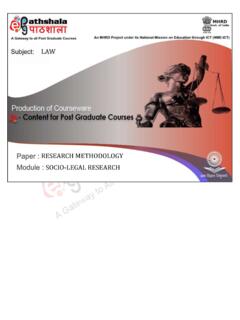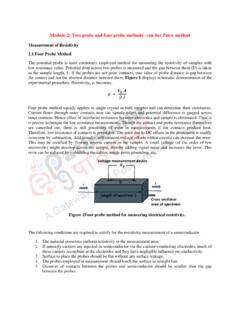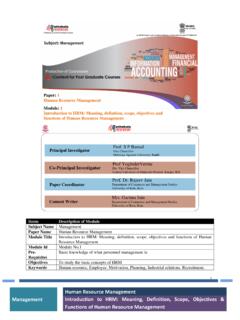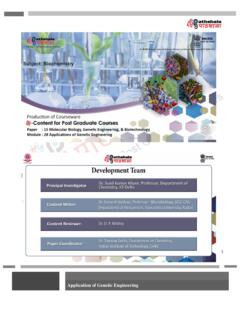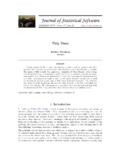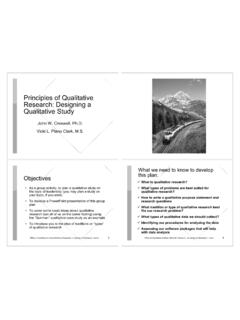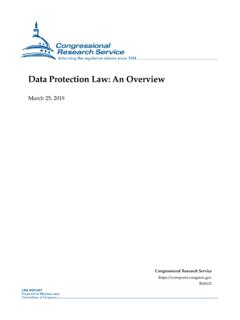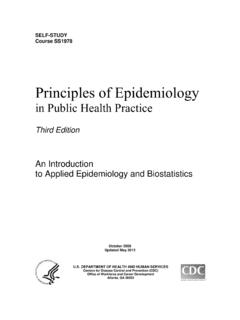Transcription of RESEARCH METHODOLOGY METHODS OF DATA COLLECTION
1 LAW RESEARCH METHODOLOGY METHODS OF data COLLECTION DESCRIPTION OF MODULE Items Description of Module Subject Name Law Paper Name RESEARCH METHODOLOGY Module Name/Title METHODS of data COLLECTION Module Id XI 1. Introduction RESEARCH is a logical and systematic search for new and useful information on a particular topic.
2 What data is to be collected? Where data will be found? How data will be collected and analysed? Are certain important questions implicit in every RESEARCH study. The method of procuring data for RESEARCH is an independent segment of RESEARCH design. Procedures used for data COLLECTION is extensively scrutinized. Existing data sources cause confusion in data selection if researchers do not posses basic knowledge of dealing with data at various stages, each of which may raise questions of validity. Inaccurate data COLLECTION can impact the results of a study and ultimately lead to invalid results.
3 There are various facts, data and information relating to RESEARCH topic available in the world. Researcher is required to make the proper objective, logical and authoritative decision that what facts may be relevant for his study or not. It is necessary in all data COLLECTION that elements of the RESEARCH process be neutral and not interferes with measurements of the variables. After selection of a principle of data COLLECTION , consistent application of standards within that method must be developed so that the measurement reflects the intended variable and is not biased by the METHODOLOGY The terms method and METHODOLOGY are frequently used in the context of legal RESEARCH .
4 They are sometimes used interchangeable to mean the same thing, but they are often used also to mean slightly different things. Therefore, it is important, to explain both terms. The Oxford English Dictionary define method as A special form of procedure or characteristic set of procedures employed (more or less 1 Noreen L. Channels, Social Science METHODS in the Legal Process (1st, Rowman & Allanheld Publishers, New Jersey 1985) 148 Role Name Affiliation Principal Investigator Prof.)
5 (Dr.) Ranbir Singh Vice Chancellor, National Law University, Delhi Co-Principal Investigator Prof. (Dr.) Bajpai Registrar, National Law University Delhi Paper Coordinator Prof. (Dr.) Bajpai Registrar, National Law University Delhi Content Writer/Author Dr Himanshu Pandey National Law University, Assam Content Reviewer Prof. (Dr.) Bajpai Registrar, National Law University Delhi systematically) in an intellectual discipline or field of study as a mode of investigation and inquiry, or of teaching and exposition.
6 The term METHODOLOGY means techniques or group of METHODS employed in a particular field of study or In the context of this module we are primarily concerned with the METHODS of data COLLECTION commonly used in legal RESEARCH . 2. Learning out come- Intended object of this module is to develop - Understanding about basics of data COLLECTION . Knowledge and practice on data COLLECTION METHODS in legal RESEARCH . Analytical skills about the nature, quality and approaches of data Basic understanding of nature, authority and reliability of various sources of data .
7 3. METHODS of data COLLECTION in Legal RESEARCH METHODOLOGY followed in any RESEARCH and METHODS forming part of METHODOLOGY depends on some questions necessarily be answered as to the nature of data , their COLLECTION method and analysis process which may differ from one stream to another. In legal RESEARCH field, RESEARCH process is centric either on doctrinal method or empirical method . Basically METHODS of data COLLECTION can be classified on following broad aspects as- 1. Nature of RESEARCH problem and RESEARCH objectives.
8 2. Authority of data 3. Reasoning followed in data COLLECTION On the basis of above three considerations RESEARCH METHODS of data COLLECTION applied in legal RESEARCH may be classified as- 1. Doctrinal and Empirical Method. 2. Primary and Secondary data . 3. Inductive and Deductive Method Doctrinal and Empirical Method Legal RESEARCH studies can be classified on the basis of nature of data intended to be used in RESEARCH . This classification can be made as doctrinal and empirical RESEARCH METHODS .
9 Doctrinal Method- Meaning of Doctrine is necessary to explain here in their ordinary and broader sense so that a comprehensive approach can be developed by readers over all about Doctrinal RESEARCH Method as approach used for data COLLECTION . Term Doctrine is derived from Latin word Doctrine , it is a codification of beliefs or a body of teachings or instructions, taught principles or propositions, as the essence of 2 Terry Hutchinson, 'Doctrinal Researh: researching the jury' in Dawn Watkins, Mandy Burton (eds), RESEARCH METHODS in Law (1st, Routledge, Abingdon UK 2013).
10 Teachings in a given branch of knowledge or belief system. A belief (or system of beliefs) accepted as authoritative by some group or school. Belief is a cognitive content held as true. In a general sense, whatever is taught or laid down as a principle or true by any authoritative and credible source is doctrine. Doctrine is also used to refer to a principle of law, in the common law traditions, established through a history of past decisions, such as the doctrine of self defence, or the principle of fair use.


